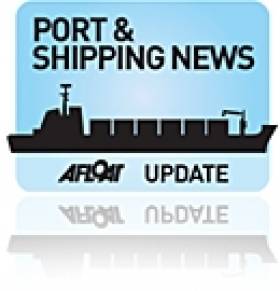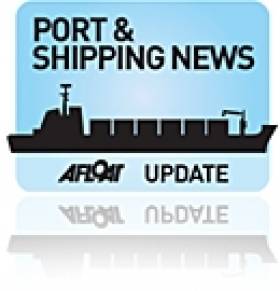Displaying items by tag: EU Transport Budget
Organisations Across Europe Ask EU to Invest More in Transport
#ports&shipping - “More EU budget for transport, the best investment plan for Europe” is the slogan launched today from a coalition of thirty European transport organisations. The campaign is calling for a strong connecting Europe Facility for the next financial period 2021-2028.
“We are very pleased to see that 30 transport organisations, covering all modes and nodes, service providers, users and cargo owners are supporting this plea for a strong financial support for the completion of the TEN-T network. 750 billion euro is needed to complete the TEN-T core network. We all know that transport projects with a high societal return do not always generate the necessary return on investment. We also believe that CEF support is the best guarantee to deliver high EU added value and responsible grant management”, says ESPO’s Secretary General Isabelle Ryckbost.
The ESPO Secretary will present the campaign on behalf of the Coalition at the Connecting Europe Conference beginning today which Afloat previously highlighted and is taking in the Estonian capital of Tallinn.
“Ports face a continual challenge to invest in long-lived port infrastructure. Even where such investments provide high added value and generate substantial economic returns, they often have low financial returns for the port authority. In the context of the review of the Connecting Europe Facility, ESPO will continue to make the case for continued and increased financial support in a variety of forms. Grants are an essential component of this”, says ESPO’s Chairman, Eamonn O‘Reilly.
The coalition's campaign has a leaflet that can be downloaded here.
Source: European Sea Ports Organisation (ESPO).
Afloat adds that O'Reilly is also the chief executive officer of the Dublin Port Company where major redevelopment works are underway at Alexandra Basin (see photo). The project is part of the port's masterplan. Next month as part of Open Dublin House, a boat tour is to take the visiting public into the basin to examine the works in progress.
EU Parliament's Vote on Transport Infrastructure Plan and Budget Agreed
#EUtransTEN - The EU Parliament gave its final agreement on the European budget envelope for 2014-2020, the Trans European Network (TEN-T) and for financial Regulation, the Connecting Europe Facility.
EPSO, the European Seaports Organisation welcomed the Parliament's vote. This decision defines the EU's infrastructure policy for the coming decades and establishes a budget of €23.17 billion earmarked for priority transport projects for the financial period 2014-2020.
This means that the budget for financing transport infrastructure will be tripled compared to the last period (2007-2014). More than 320 sea ports feature on the new TEN-T maps and 94 ports are part of the core network.
ESPO's Secretary General Isabelle Ryckbost said: "This vote is an important step towards establishing a real transport "network". We fought hard to defend this budget and to have our ports well represented in the network and network corridors. We now look forward to see a fair share of these funds used to improve Europe's port infrastructure and to better integrate these core nodes in Europe's transport network. There is a plan, there is a budget".
She added, "Let us now start looking at the implementation. The core network corridors structures will be powerful instruments. I do hope ports will have their say in the set up and functioning of these corridor structures. Moreover, as ESPO we must also focus on the Motorways of the Sea priority. If well used, it can be an important instrument to increase intra-EU maritime transport and strengthen the cooperation between European ports".
European Transport Sector Say “Yes, But… to EU Transport Budget Deal
#EuroPortBudget- As previously reported, the EU budget for transport infrastructure projects over the next seven years, has been agreed at €23 billion.
Among the reaction of several bodies, including the European Sea Ports Organisation (ESPO), is that this is a significant step forward compared to the €8 billion that was set aside for the Trans-European Transport Networks (TEN-T) in the 2007-2013 period, an amount which member states have fully taken up according to the latest Commission data.
With a cut of one third in the €32 billion initially foreseen for transport infrastructure projects, transport does not appear to be considered a priority sector in the next budget.
But at the same time, the substantial cut that was made compared to the initial €32 billion will seriously affect the implementation of the transport infrastructure plan the Commission has been developing over the last three years, in close co-operation with Member States and stakeholders.
In a first common reaction to this result, European transport organisations EFIP, ESPO, INE, IRU, PDI, ECG, ECSA, ETF, ECASBA, ACI Europe and CER say: "We are satisfied that the transport infrastructure envelope has increased, compared to the current multi-annual budget. Nonetheless, it is a missed opportunity that European leaders decided to cut a growth-stimulating sector.
European President Van Rompuy said the budget must be an engine for growth and jobs in the future. It is high time for national governments and their leaders to realise that transport is the engine of the European economy.
If people and goods cannot move efficiently, growth and economic development are constrained. In our view, transport therefore deserves more than a mere 2.4% share of the total budget."
Even if European transport organisations EFIP, ESPO, INE, IRU, PDI, ECG, ECSA, ETF, ECASBA ACI Europe and CER remain critical about the deal, they believe it is important that the new EU budget plan for 2014-2020 is adopted soon.
"Realistically, the TEN-T core network and the already defined projects of the ten multimodal corridors cannot be fully implemented with such a small envelope. It means that the robust methodology developed by the European Commission to select projects that are essential to the European transport network cannot be applied.
A first come, first serve basis will prevail over the network logic that the internal market so desperately needs. We therefore call on Member States to engage with the European Parliament to make this budget more growth-oriented.
In addition, we fully support Parliament's plea to have a mid-term review in a few years as a way to assess potential reallocations of the budget towards growth-generating sectors like transport. In a similar vein, we agree that a certain flexibility within budget allocations would benefit its overall effectiveness.
Last but not least, a swift agreement on the EU budget will allow for progressing with implementing the new transport infrastructure plan, as outlined in the TEN-T and CEF regulations."































































